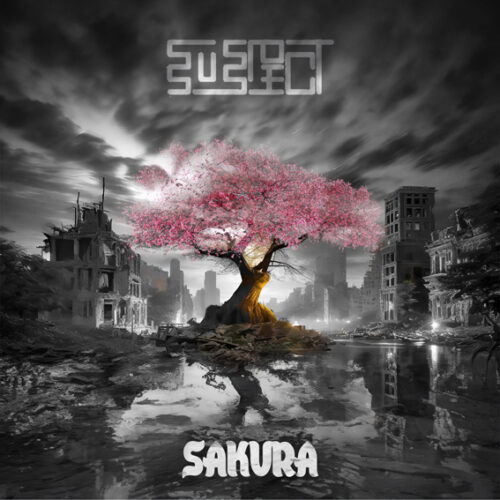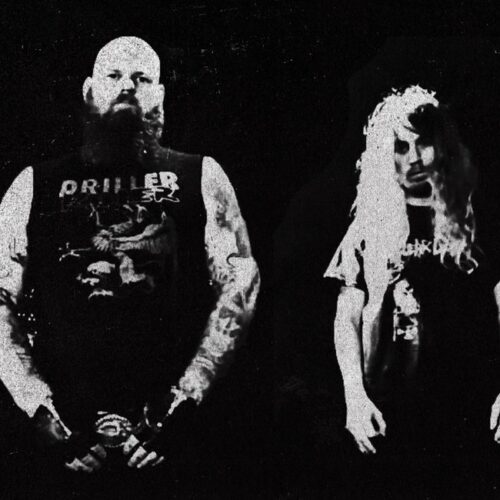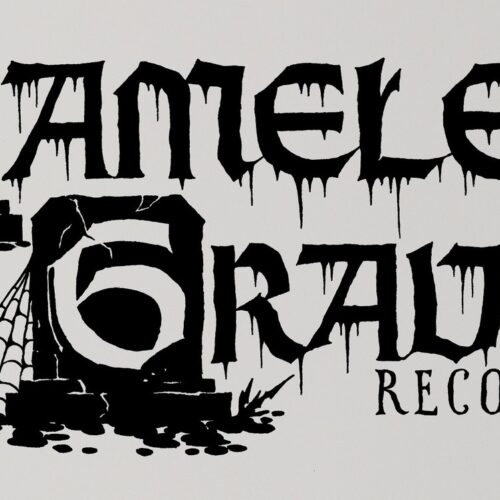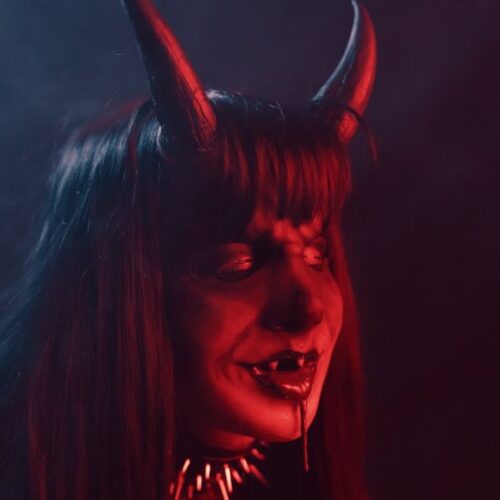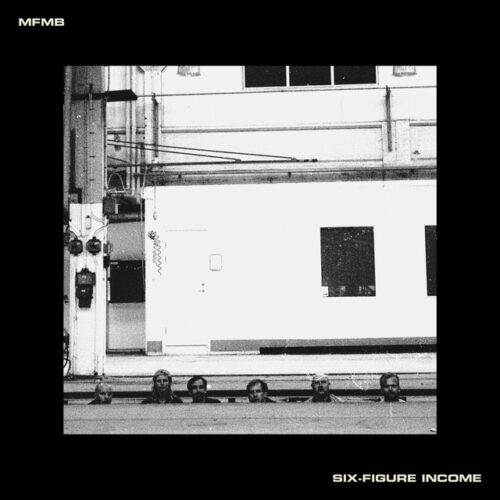FROM THE DEPTHS

When and why did Catharsis split and how did From The Depths get together?
Brian: Catharsis ended after the last tour we did and that was basically because we did a five month tour. We decided to do the world’s longest DIY tour and it was one of the hardest things anyone of us has experienced. But the band was pulling in different directions at the end anyway. Most good bands are a combination of different things, from tendencies to members fighting each other – so it was time for that band to end. There are always personal differences in a band from the beginning to the end. It’s more a question of when it’s worth working them out. Everybody in that band still cares about each other but we’re doing different things in our lives now and that’s normal. It’s not strange that we broke up then, it’s a miracle we stayed together as long as we did. A lot of bands that are playing festivals in Europe now have been together for twenty years but it’s not the same people. Or for thirty years and there’s just one member from the beginning. And we know why they’re together. They’re together for the money. Everything we did in Catharsis we only did because we wanted to. There was no incentive for us to stay together, except to do what we wanted to do together. About the formation of this band: I was in a band with our bassist Steve after Catharsis just because we wanted to be in another band together. Stef (guitar), who played in Catharsis near the end was also in that band. And Rob who played bass on our last tour with Catharsis is playing drums with us now. So, some of us are still connected to each other.
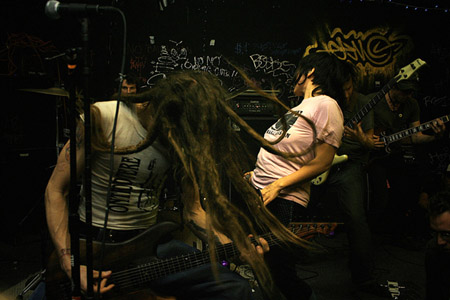
So you guys all play several instruments…
Brian: Well, sort of. I wouldn’t say that I play guitar well…
Monica: …But passionately.
Brian: It’s punk rock, ha ha. Everybody else in this band is probably a better musician than I am. But with this band, I would say, we just started out of some similar musical interests but also because we are all on the same page with politics.
Monica: We’ve been living together, working on projects together or have mutual friends and play in different bands largely because we have a common desire to make music and to make a certain kind of political that was not happening very much in the US and that’s till not happening very much in the US. It seems like there are a lot of anarchist bands in Europe and in the US, there are some DIY punk bands or anarchists but very few of them.
It wasn’t always the case, I believe…
Brian: It’s hard to tell. I’ve been playing in punk bands since 1989 actually and I’ve been to different places myself all that time. I feel like when I got involved in punk it wasn’t very political. It seemed like there were a lot more bands in the end of the 1990s that were more specifically political and now, like Monica says, it seems like there are less again. But it might be that when I first started playing I didn’t know what the hell was going on. Then I met all the other bands that were doing things like we were doing. Now I’m old and don’t know what’s going on again.
If you compare Catharsis and From The Depths, what are the main similarities and differences?
Brian: I guess in some ways this has been the easiest band to be in, in terms of everyone having the same political values. Just to give you an example: in the previous bands, when there was a demonstration, maybe some of us would go to the demonstration. With this band, we’ve been able to go to demonstrations and I think honestly that we play together better in the streets than we do at a show. That’s an advantage, that make things easier. Alexei (Rodriguez, drums) and I were in Catharsis, Alexei was the person who introduced me to punk rock, so of course he and I have a really close relationship in terms of what it was to play music.
How would you describe the lyrical concept of From The Depths? How does the band name and the cover artwork fit in this concept?
Brian: It’s a hard question to answer because if it was such a simple thing to describe we wouldn’t have to have the band, the lyrics and so on to explain it. I guess the band name and the record title have sort of a double meaning about depths of defeat, despair, failure… And also that’s where things grow from, of course. From the soil. The soil of empathy. Don’t make me start quoting our lyrics, though.
When you play abroad, do you still use interpreters from the audience on stage, like you did at the Catharsis shows?
Brian: On this tour, we did that less because there’s more English in Europe.
Monica: It seems like basically every country we’ve been to many people still do not speak English well. Then we try to find somebody who can translate. We’re talking about politics, the songs and the way we feel about the songs. It’s an integral part of our shows and it’s important to me and to all of us that it comes across no matter where we play.
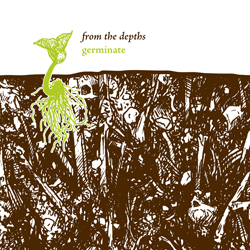 You brought out your “Germinate” album on CD, on vinyl and you put it out on the Internet as well.
You brought out your “Germinate” album on CD, on vinyl and you put it out on the Internet as well.
Monica: What we did was a new experiment for us. We made the album downloadable with the lyrics, the cover art and everything you get in a CD. I don’t know how successful this has been. I think less people have downloaded the album in this way than we expected.
Brian: We’re pretty suspicious of the Internet generally. I think it puts more information available to people but it makes information less meaningful to people. Eventually, there will be an Internet amount of information that is all meaningless to people. The reason punk music was so important for so many of us in the beginning is that there wasn’t much made by us. By the community, that is. And so every record that came out was really important to people. The Internet as a structure tends to erase meaning just by making things available. And that’s potentially a problem.
What is your audience like? Are there old fans at the shows who still remember you from Catharsis?
Brian: Maybe a few. We haven’t really been trying to be an ex-member band. We’re just another political DIY band. Many people who are excited about our band are more anarchists than punks. I think there’s a lot of turnover in the punk scene, maybe more so than in the anarchist movement, so maybe that explains our audience.
Monica: It’s clear to me touring in the US with this band and then coming to Europe how popular Catharsis was in Europe. People who come to our shows in the US are largely anarchists and people that we know through a political network. In Europe, it seems like that but there’s a number of people who are there because they loved Catharsis.
Brian: And I think it’s partly because there is more continuity between communities in Europe. People stay involved in punk longer and so there is more collective memory. Catharsis was known in the US also but the people who came to the shows in 1997 in the US in the punk scene are almost all gone while some of the same people are still coming to shows or organizing shows in Europe.
CrimethInc. is the driving force behind you. Could you explain what it is exactly?
Brian: CrimethInc. is a small collective of determined individuals who are basically trying to overthrow all governments and power structures. Music and cultural production is one of the less important things we do now. We do other kinds of organizing and lots of publishing. We do books, Monica and I co-edit a magazine together. We do a lot of organizing on our home town. There is an anarchist market called „Really Really Free Market” which is not only for anarchists or punks but everybody from the community comes and brings things they don’t need so that people can take whatever they need.
Monica: We do a lot of work on prison abolishing. In the US, prison industrial complexes are totally massive. There are 2.3 million people in prison in the US. So we have a project that sends books and other reading materials into prisons. We also have some local campaigns against some of the particularly inhumane practices of the system.
Brian: Besides that, like I said, Monica and I do a magazine together called Rolling Thunder. We work on this with a couple of other people. It comes out twice a year, basically analyzing popular struggles around the world and especially in the US from an anarchist perspective. Besides that, a lot of other writing, organizing for demonstrations and other things… We don’t have any serious musical projects besides this.
How would you explain what anarchism means?
Monica: For me, it is the idea that people in communities should have autonomy, self-determination and the space to be able to decide collectively for themselves. A way of living that is liberatory for the people, the animals and the environment we’re part of.
Brian: Basically, it’s opposition to oppression. But that’s the simplest way to explain that and there are lots of different kinds of oppression so being anarchists means a lot of different ways. It’s not really a simple answer, it’s more a beginning of a lot of questions… I think capitalism, if you want to call it that, has produced at least two ways for human beings to destroy our life on Earth in the last hundred years between the nuclear bomb and the climate change… And it will probably produce some more if we don’t do something and one day we will probably destroy everything. We have seen the things that happened in former Yugoslavia, we can see what kind of struggles are going to happen as the economic crisis spreads around the world. If people don’t look to a solution beyond nations, beyond fighting between ethnic groups, I think the future is going to look really dark. Unless people find another way to do things. The good news is that there is going to be a change. It will be a change for the worse or a change for a better – but there’s going to be one.
In what we call popular culture, there are several recent works, e.g. movies about the possible end of the world in 2012. What do you think of that?
Brian: Well, people said it would happen in 1999 also, and many times before that. I don’t really believe in what I see in movies.
Monica: I think it has a very little meaning to talk about what direction the world is going in. I think it’s always easier to see the direction that the corporations and the politicians would like to take us. The pop culture and the mass media would like to tell us that everybody wants to go in that direction but it seems clear looking at the popular uprisings that has been happening all over the world that some people all over the world are wanting things to go in a very different direction. The question is which of these forces will win. If we continue in the direction where we’re destroying the ecosystem that sustains us and life on this planet, if we continue pushing people into hating each other and fighting each other more and more because of the color of their skin or the place where they come from, we are certainly going to destroy ourselves and everything that’s living on this planet. But then, there’s definitely this other tendency, this other direction anarchists and many other people are pulling towards. This direction is less certain or less clear, it’s harder to tell exactly what is in this direction but it seems like inevitably there has to be an opposition.
Brian: We can’t know what the future is. What we can control is what we do. We don’t know if we will win – but we can live with dignity. Right now, that means choosing a side.
When you are in foreign countries, are you interested in what is happening there?
Monica: We have been traveling a lot and we went from Italy to Greece. We took the ferry. And we worked our way up Eastern Europe. The situation in Greece right now is very interesting because anarchists and political dissidents of all kind have a lot of social power. There is a lot of unrest right now in some exciting ways and the things that have been going on in Greece have been very inspirational to us. The political situation in different countries is connected to each other. I think the anarchists in Greece are well aware of this. A couple of our friends from Greece came to the US recently. They wanted to know what the situation in the US was and we want to help them move towards political victory because what happens in the US is connected to what happens in Greece. So everywhere we go we want to know what is happening politically, we want to be exchanging ideas, tactics and strategies because I certainly feel that how things are happening politically here are connected to how things are happening politically there.
Do you think what is happening in Greece right now could be sort of a warning sign and people could learn anything from it?
Brian: I don’t know. I can’t say what the public is going to do and what we are going to do. We will try to show that there are other ways forward. All we can really do is try to popularize other values besides competition, besides trusting the governments and the corporations and not trusting each other. Basically, all we can do is try to show there are other values. Comparing to Greece, Hungary was under a communist dictatorship and Greece was under a fascist dictatorship. In both cases, people go to the opposite direction. But there’s not going to be a solution that involves authorities because they’re the cause of the problem.
What do you think the future of From The Depths, CrimethInc., hardcore / punk and anarchism is?
Brian: You can’t predict the future. You can’t know what’s going to happen. Sometimes that makes it hard to plan. For me, it’s more important that we make our own initiatives so that we are not always reacting, not always standing on the back foot and so that we make decisions and have our own projects. That can carry us forward.


